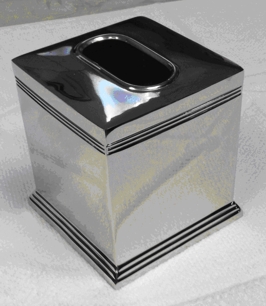The Maryland Department of the Environment has confirmed that metal tissue box holders containing low levels of radioactive material have been removed from the shelves at two Bed Bath & Beyond stores in Maryland.
The contaminated boxes do not present an immediate health threat. Bed Bath & Beyond has issued a statement indicating that the product has been removed from store shelves and has been withdrawn from online sales. The company says customers who have purchased the product – described as the Dual Ridge Metal Boutique tissue holder and pictured below – should bring it to the nearest Bed Bath & Beyond location for a refund. The company encourages any customer who has a question to call 1-800-462-3966.
On January 6, the United States Nuclear Regulatory Commission was notified by the state of California that a delivery truck triggered a radiation alarm at a weigh station. Two packages in the truck showed the presence of radioactive cobalt-60. The packages were en route to Bed Bath & Beyond stores. The shipment contained four Model DR9M Dual Ridge Metal Boutique tissue box holders. The product is manufactured in India. Based on available information, the shipment with contaminated items went only to Bed Bath & Beyond stores.
The Bed Bath & Beyond statement indicated that the product has been carried since July in about 200 of the company’s stores in the United States and Canada. MDE’s Radiological Health Program received information that the product was shipped to Bed Bath & Beyond stores at 9021 Snowden River Parkway, Columbia, and 5413 Urbana Pike, Frederick.
At the Columbia location, an MDE inspector found that four of the five tissue box holders in stock contained levels of radioactive material by use of a meter. At the Frederick location, the MDE inspector found that three of the five tissue box holders in stock contained levels of radioactive material. The stores have secured the items.
Other products from the manufacturer’s line were surveyed at the two stores and no elevated levels were detected.
Readings show that a person spending 30 minutes a day, every day for year, in a bathroom near one of the tissue box holders might receive a radiation dose equivalent to two to three chest X-rays. The cobalt is believed to be fixed in the metal, meaning it cannot be inhaled and it cannot contaminate other objects.
The federal agencies involved are the Consumer Products Safety Commission, the Nuclear Regulatory Commission, the Department of Transportation, and the Environmental Protection Agency.
